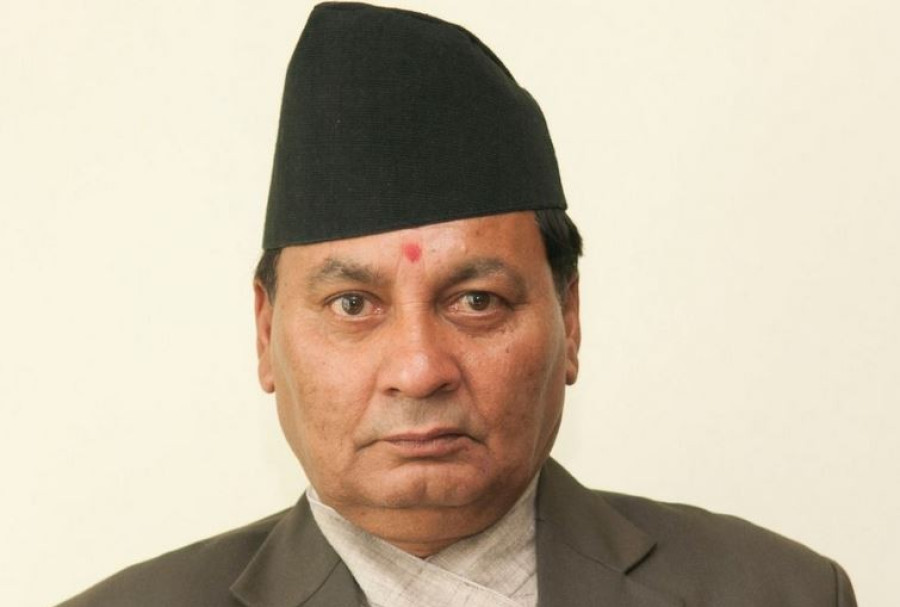National
Anti-corruption commissioner resigns over bribery scandal
Raj Narayan Pathak, a commissioner at the Commission for Investigation of Abuse of Authority, resigned from his post on Friday after being embroiled in a controversy for allegedly receiving a bribe of Rs78 million to settle a dispute regarding an engineering college
Prithvi Man Shrestha
Raj Narayan Pathak, a commissioner at the Commission for Investigation of Abuse of Authority, resigned from his post on Friday after being embroiled in a controversy for allegedly receiving a bribe of Rs7.8 million to settle a dispute regarding an engineering college.
The President’s Office confirmed in a statement that Pathak submitted his resignation to President Bidya Devi Bhandari as per Article 238 (4A) of the constitution.
Amid reports that lawmakers from the ruling parties were preparing to register an impeachment motion against Pathak, he had reached the President’s Office at around 11am on Friday to tender his resignation, according to officials at Sheetal Niwas.
“After the President accepted his resignation, we issued the press release,” said Chhabindra Parajuli, spokesperson for the President’s Office.
Pathak is the second commissioner to leave the CIAA on the ground of controversies after then chief commissioner Lokman Singh Karki, against whom lawmakers had registered an impeachment motion in the erstwhile Legislature-Parliament on October 19, 2016, leading to his suspension from the post. Before being impeached by Parliament, however, the Supreme Court invalidated Karki’s appointment in a landmark verdict on January 8, 2017, terming him unfit for the office.
After Pathak tendered his resignation, lawmakers who were preparing to register an impeachment motion have abandoned their plan. MPs from the ruling Nepal Communist Party (NCP) including its Chief Whip Dev Gurung, Subas Nembang and Krishna Bhakta Pokharel among others had drafted a proposal for the impeachment motion.
“After Pathak resigned from his post, the role of Parliament has ended because impeachment motion cannot be initiated against a person who is no longer in the post,” said Nembang. “But the reason why the issue was raised must be addressed through the due legal procedure.”
According to him, before Pathak’s resignation, they had initiated a discussion with the Nepali Congress and the Rastriya Janata Party-Nepal on the impeachment plan. With the President approving his resignation, Pathak has potentially saved facilities that a commissioner of a constitutional body is entitled to after resignation. A person who is relieved of office due to impeachment is not entitled to any facility accruing from such office and to be appointed or nominated to any public office in future, according to Article 101 (9) of the constitution.
There had been a call for initiating an impeachment motion against him instead of letting him resign. In a statement, the Bibeksheel Nepali Party stated that the practice so far shows that the issue is being allowed to settle by letting the accused resign. “As long as such practice remains, there cannot be good governance,” the party said.
The party has also questioned the prime minister’s speeches about zero tolerance against corruption saying that KP Sharma Oli kept the issue of video showing Pathak’s involvement in bribery secret for four months.
According to reports, Oli and senior leaders of the ruling party had seen the video of Pathak taking bribe four months ago.
Only after the media including Kantipur exposed it, did the ruling party leaders discuss the issue on Thursday. During the meeting, Oli had instructed the party leaders to proceed with the impeachment motion, according to NCP sources.
Those who had bribed Pathak had conducted a sting operation on him after he failed to settle the issue of the college in favour of them even after taking the money. There was a dispute between board members of the college about whether to run the institution as a non-profit or a company.
A team of board members led by Lambodar Kumar Neupane was in favour of running the college under the Company Act while another group led by Deepak Bhattarai wanted to run it as a non-profit institution.
After the dispute, a complaint was registered at the CIAA. Pathak, who oversaw the education sector, had reportedly sought bribe from one of the sides to settle the issue. As Pathak failed to decide in favour of those who bribed him, the sting operation was conducted.
According to reports, Pathak accepted the bribe in two installments of Rs4 million and Rs3.8 million. In a video uploaded by Nepalkhabar.com, he describes his action as a “wrong act of my life”, in talks with one of the sting operators. Even the commissioners at the CIAA are said to be aware of the scandal.
Another video uploaded by Kantipur on its website shows Pathak assured the sting operators that he would work for them after becoming the chief commissioner.
When one of the commissioners asked Pathak about the video about two months ago after a weekly newspaper reported about it, Pathak had commented that he always faced protests from them. “They are coming after me,” a CIAA source quoted Pathak as saying.
The CIAA commissioners on Thursday asked Pathak about his plan after the media reported the case. “We had asked him to give due consideration for the news about the graft video,” said a commissioner. He had then left the office in a tense mood, according to the commissioner who did not want to be named.




 16.12°C Kathmandu
16.12°C Kathmandu














